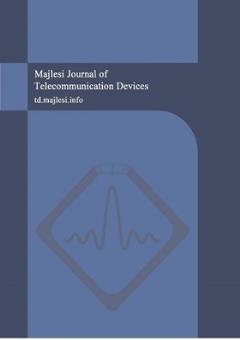Adaptive Sliding Mode Control Design based on Disturbance Compensator for Controlling Multi-Agent Robots
الموضوعات : Majlesi Journal of Telecommunication Devices
Samira Zalaghi
1
![]() ,
amirhossein zaeri
2
,
amirhossein zaeri
2
1 - Department of Electrical and Electronic Engineering, Islamic Azad University, Tehran, North Branch, Iran
2 - Department of Electrical and Electronic Engineering, Shahinshahr Branch, Islamic Azad University, Shahinshahr, Isfahan, Iran.
الکلمات المفتاحية: Multi-agent System, Arrangement Control, Sliding Mode Control, Adaptive Disturbance Observer.,
ملخص المقالة :
In this research, the goal is to develop a sliding mode control strategy based on the disturbance compensator to control the arrangement of a multi-agent system. For this purpose, the exponential access law is used to derive chattering-independent sliding mode control laws. In this design method, the sliding level information and its sign are used simultaneously, and by properly adjusting the sliding gain so that it is relatively larger than the switching gain, chattering effects can be removed significantly. On the other hand, since the adjustment of the switching gain is closely related to the changes of uncertainty and external disturbances, an adaptive approach is used to determine it. This is done using the Lyapunov stability theory and it is expected that the switching gain matching law is directly dependent on the instantaneous information of the sliding surface. In addition, to improve the consistency of the closed loop and adaptability to the environmental conditions and parameter changes of the system, a perturbation observer such as the developed mode observer is used.
[1] H. Du and S. Li, ‘Attitude synchronization for flexible spacecraft with communication delays’, IEEE Transactions on Automatic Control, vol. 61, no. 11, pp. 3625–3630, 2016.
[2] Z. Zhang, Y. Zheng, X. Xiao, and W. Yan, ‘Improved order-reduction method for cooperative tracking control of time-delayed multi-spacecraft network’, Journal of the Franklin Institute, vol. 355, no. 5, pp. 2849–2873, 2018.
[3] P. Li, ‘Global finite-time attitude consensus tracking control for a group of rigid spacecraft’, International Journal of Systems Science, vol. 48, no. 13, pp. 2703–2712, 2017.
[4] I. Shames, B. Fidan, and B. D. O. Anderson, ‘Close target reconnaissance with guaranteed collision avoidance’, International Journal of Robust and Nonlinear Control, vol. 21, no. 16, pp. 1823–1840, 2011.
[5] B. D. O. Anderson, B. Fidan, C. Yu, and D. Walle, ‘Uav formation control: Theory and application’, in Recent Advances in Learning and Control, V. D. Blondel, S. P. Boyd, and H. Kimura, Eds., London: Springer London, 2008, pp. 15–33, ISBN: 978-1-84800-155.
[6] D. van der Walle, B. Fidan, A. Sutton, Changbin Yu, and B. D. O. Anderson, ‘Non-hierarchical uav formation control for surveillance tasks’, American Control Conf., pp. 777–782, 2008.
[7] K. Guo, X. Li, and L. Xie, ‘Ultra-wideband and odometry-based cooperative relative localization with application to multi-uav formation control’, IEEE Transactions on Cybernetics, pp. 1–14, 2019.
[8] W. Ren and Y. Cao, ‘Distributed coordination of multi-agent networks: emergent problems, models, and issues’. Springer Science & Business Media, 2010.
[9] V. E. Pryanichnikov, A. A. Aryskin, S. R. Eprikov, K. B. Kirsanov, R. V. Khelemendik, A. Y. Ksenzenko, E. A. Prysev, and A. S. Travushkin, ‘Technology of multi-agent control for industrial automation with logical processing of contradictions’, Annals of D.
[10] V. N. Coelho, M. W. Cohen, I. M. Coelho, N. Liu, and F. G. Guimarães, ‘Multi-agent systems applied for energy systems integration: State of-the-art applications and trends in microgrids’, Applied Energy, vol. 187, pp. 820 –832, 2017.
[11] O. J. Shukla, A. Joshi, G. Soni, and R. Kumar, ‘Analysis of critical drivers affecting implementation of agent technology in a manufacturing system’, Journal of Industrial Engineering International, vol. 15, no. 2, pp. 303–313, 2019.
[12] H. Du, M., Zhao, D., Yang, M., & Chen, “Nonlinear extended state observer-based output feedback stabilization control for uncertain nonlinear half-car active suspension systems,” Nonlinear Dyn., vol. 100, pp. 2483–2503, 2020.
[13] Du, M., Zhao, D., Yang, M., & Chen, H,” Nonlinear extended state observer-based output feedback stabilization control for uncertain nonlinear half-car active suspension systems”, Nonlinear Dynamics, Vol.100, No.3, pp.2483-2503, 2020.
[14] Zhao, D., Zou, T., Li, S., & Zhu, Q, ‘Adaptive backstepping sliding mode control for leader–follower multi-agent systems’, IET control theory & applications, Vol.6, No.8, pp.1109-1117, 2012.


